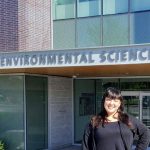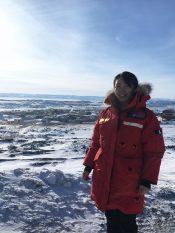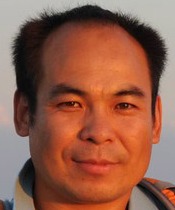Vidya Anderson, PhD
Email: vidya.anderson@utoronto.ca
 Dr. Vidya Anderson is a project manager with the Ontario Ministry of the Environment, Conservation & Parks in Toronto, Ontario, Canada where she is responsible for developing climate change mitigation and resilience policies and programs. She also teaches the ‘Climate Change and Health’ course in the Interdisciplinary Centre for Health & Society at the University of Toronto Scarborough. Vidya holds a Ph.D. in Environmental Science from the University of Toronto and has been a member of the Climate Lab since 2013. Her doctorate has a dual specialization in environmental science and public health and her research is interdisciplinary with a focus on building sustainable, healthy, and climate resilient communities using nature-based solutions. Her research has included development of public policy frameworks and community development tools for climate change adaptation, decarbonization, and planetary health. Vidya’s research interests include complex climate change adaptation and mitigation; green infrastructure and sustainable building design; food security and urban agriculture systems; thermal comfort and urban heat islands; and air pollution. Vidya’s publications include a climate modeling study as part of a climate change toolkit for communities, on behalf of the Ontario Ministry of Health and Long-Term Care. This modeling study was the first of its kind in Canada, forecasting the health impacts of climate change for individual communities across the province of Ontario. Vidya was awarded an Amethyst Award by the Government of Ontario in 2016 for this work – the highest award given in recognition of extraordinary public service.
Dr. Vidya Anderson is a project manager with the Ontario Ministry of the Environment, Conservation & Parks in Toronto, Ontario, Canada where she is responsible for developing climate change mitigation and resilience policies and programs. She also teaches the ‘Climate Change and Health’ course in the Interdisciplinary Centre for Health & Society at the University of Toronto Scarborough. Vidya holds a Ph.D. in Environmental Science from the University of Toronto and has been a member of the Climate Lab since 2013. Her doctorate has a dual specialization in environmental science and public health and her research is interdisciplinary with a focus on building sustainable, healthy, and climate resilient communities using nature-based solutions. Her research has included development of public policy frameworks and community development tools for climate change adaptation, decarbonization, and planetary health. Vidya’s research interests include complex climate change adaptation and mitigation; green infrastructure and sustainable building design; food security and urban agriculture systems; thermal comfort and urban heat islands; and air pollution. Vidya’s publications include a climate modeling study as part of a climate change toolkit for communities, on behalf of the Ontario Ministry of Health and Long-Term Care. This modeling study was the first of its kind in Canada, forecasting the health impacts of climate change for individual communities across the province of Ontario. Vidya was awarded an Amethyst Award by the Government of Ontario in 2016 for this work – the highest award given in recognition of extraordinary public service.
Vidya’s other publication:
- Anderson, V., Leung, A.C.W., Mehdipoor, H. et al. (2021). Technological opportunities for sensing of the health effects of weather and climate change: A state-of-the-art-review. Int J Biometeorol. https://doi.org/10.1007/s00484-020-02063-z
- Paterson, J., Yusa, A., Anderson, V., & Peter Berry, P. (July 2016). Ontario climate change and health vulnerability and adaptation assessment guidelines: Workbook. DOI: 10.13140/RG.2.2.22121.19044
- Ebi, K., Anderson, V., Berry, P., Paterson, J., & Yusa A. (July 2016) Ontario climate change and health vulnerability and adaptation assessment guidelines: Technical document. Report number: ISBN 978-1-4606-6228-1
- Anderson, V. (June 2016). A harmonized heat warning and information system for Ontario (HWIS). DOI: 10.13140/RG.2.2.17926.88645
- Jancloes, M., Anderson, V., Gosselin, P., Mee, C., Chong, N.J. (2015). WWOSC 2014: Research needs for better health resilience to weather hazards. Int. J. Environ. Res. Public Health, 12, 2895-2900. https://doi.org/10.3390/ijerph120302895
- Douglas, A.G., Lemieux, C.J., Nielsen, G., Gray, P.A., Anderson, A., & MacRitchie, S. (2014). Responding to the effects of climate change in the Lake Simcoe watershed: A pilot study to inform development of an adaptation strategy on a watershed basis. DOI: 10.13140/RG.2.1.1295.7607
Ken Butler, PhD
Email: ken.butler@utsc.utoronto.ca
Personal website

Dr. Butler is an applied statistician who is greatly interested in how researchers apply statistical methods. He sees it as his job to make sure that Climate Lab members are using sound statistical methods, and he will not rest until everyone is using R! He knows very little about climate (as evidenced by the kind of questions he asks), but is enjoying the learning process.
Ken’s contribution: Stuff for Cold Climate and Severe Weather groups: https://www.utsc.utoronto.ca/~butler/climate-lab/
Adam Fenech, PhD
Email: afenech@upei.ca
UPEI Climate Lab

Dr. Fenech has worked extensively in the area of climate change for over 25 years starting with the IPCC First Assessment Report. He has edited 7 books on climate change, most recently as editor of the journal on Climate Impacts and Adaptation Science. Adam has taught at the University of Toronto since 1998, and lectures regularly at universities across Canada and around the world. He shared in the 2007 Nobel Peace Prize for his work with the Intergovernmental Panel on Climate Change. After almost 25 years as a climate researcher with Environment Canada, Adam joined the University of Prince Edward Island as the director of the Climate Research Lab.
Micah Hewer, PhD
Email: micah.hewer@utoronto.ca

Dr. Micah Hewer is currently a Research Associate in the Department of Physical and Environmental Sciences at the University of Toronto Scarborough, working under the supervision of Professor William Gough. Micah earned his Ph.D. in Physical Geography at the University of Toronto, where we studied the impacts of climate change on zoo attendance in Toronto. Previously, he earned a Master of Environmental Studies from the University of Waterloo, where he studied the impacts of climate change on park visitation in Ontario. Initially, Micah earned a Bachelor of Tourism Studies from Brock University, where he studied climate change mitigation for hotel management in Niagara Falls. Dr. Hewer is an applied climatologist and Canadian geographer who studies climate change impacts and adaptation across a range of important social, economic, and environmental topics (recreation and tourism; grape and wine; ice and snow; extreme heat and human health).
Micah’s other publications:
- Rutty, M., Hewer, M., Knowles, N., & Ma, S. (2022). Tourism & climate change in North America: regional state of knowledge, Journal of Sustainable Tourism. https://doi.org/10.1080/09669582.2022.2127742
- Hewer, M.J. & Brunette, M (2020). Climate change impact assessment on grape and wine for Ontario, Canada’s appellations of origin. Regional Environmental Change. https://doi.org/10.1007/s10113-020-01673-y
- Hewer, M. J. (2020). Determining the Effect of Extreme Weather Events on Human Participation in Recreation and Tourism: A Case Study of the Toronto Zoo. Atmosphere 2020, 11(1), 99. https://doi.org/10.3390/atmos11010099
Yukari Hori, PhD
Email: y.hori@utoronto.ca

Yukari (Hannah) Hori has completed her Ph.D. degree in the Graduate Department of Physical and Environmental Sciences at UTSC and the Environment and Health collaborative program at the School of the Environment, University of Toronto. Her doctoral research investigated regional climate change impacts on winter road systems for First Nations communities in the western James Bay region of northern Ontario. In particular, she worked on integrating data from climate models and statistical measures with local/Indigenous knowledge in order to understand how winter road systems have been affected by local environmental and climatic changes, and how First Nations communities are vulnerable and/or adaptable to changes in local community infrastructure. As her postdoctoral research, she has been working on the impacts of climate change on winter road networks in each province of Canada which are located south of the 60th parallel, as well as on winter roads/ice roads/resource roads/winter trails in the three Canadian Territorial North.
Yukari’s other publications:
- Barrette, P.D., Hori, Y., & Kim, A.M. (2022). The Canadian winter road infrastructure in a warming climate: Toward resiliency assessment and resource prioritization. Sustainable and Resilient Infrastructure. https://doi.org/10.1080/23789689.2022.2094124
- Sharma, S., Blagrave, K., Watson, S.R., O’Reilly, C.M., Batt, R., Magnuson, J.J., Clemens, T., Denfeld, B.A., Flaim, G., Grinberga, L., Hori, Y., Laas, A., Knoll, L.B., Straile, D., Takamura, N., Weyhenmeyer, G.A. (2020). Increased winter drownings in ice-covered regions with warmer winters. PLoS ONE 15(11): e0241222. https://doi.org/10.1371/journal.pone.0241222
- Duckert, D., Nelson, C., Hori, Y., & Cornwell, A. (March 2020). MUSKRAT DAM WINTER ROAD CLIMATE CHANGE ADAPTATION REPORT: Historic Relations, Challenges, and Adaptation Strategies.
- Knoll, L.B., Sharma S., Denfeld, B.A., Flaim, G., Hori, Y., Magnuson, J.J., Straile, D.& Weyhenmeyer, G.A. (2019) Consequences of lake and river ice loss on cultural ecosystem services. Limnology and Oceanography Letters, 4(5), 119-131. https://doi.org/10.1002/lol2.10116
- Hori, Y., and Gough, W.A. (July 2018). The state of Canadian winter roads south of the 60th parallel: historical climate analysis and projected future changes based on the climate model projections. Indigenous and Northern Affairs Canada.
Hori, Y., and Gough, W.A. (June 2017). The state of Canadian winter roads south of the 60th parallel: current conditions, adaptive opportunities and projected season length in a changing climate. Indigenous and Northern Affairs Canada. - <CAGONT Doctoral Essay Contest Award> Hori, Y., Tam, B., Tsuji, L.J.S, and Gough, W.A. (October 2013). Trends in the duration of winter road season in the western James Bay region of northern Ontario. 2013 Joint Annual Meeting of East Lakes Division AAG (ELDAAG) and Canadian Association of Geographers Ontario Division (CAGONT).
Monirul Mirza, PhD
Email: monirul.mirza@utoronto.ca

Dr. Monirul Mirza is currently working with the Adaptation and Impacts Research Section (AIRS), Environment Canada as a Physical scientist. He is also an Adjunct Professor in the Department of Physical and Environmental Sciences, University of Toronto at Scarborough. He studied in Bangladesh and New Zealand. A Water Resources Engineer, he received his PhD from International Global Change Institute (IGCI), University of Waikato, Hamilton, New Zealand on climate change and flood modeling in Bangladesh. He has been associated with the Intergovernmental Panel on Climate Change (IPCC)-the winner of the 2007 Nobel Peace Prize, Working Group II since 1997 and contributed as a Coordinating Lead Author (CLA) to its various assessments. He was the only Canadian selected as the Core Writing Team member of the Synthesis Report of the IPCC’s Fourth Assessment Report. Currently he is contributing as a Lead Author to the IPCC’s Special Report on Renewable Energy. He is currently contributing to 5th Assessment Report of the IPCC. He also participated in two recent large assessments- the Millennium Ecosystem Assessment and the Integrated Assessment of Agriculture, Science, Technology for Development (IAASTD) commissioned by the World Bank. He is the Executive Editor of ‘Asia Pacific Journal of Environment and Development’ (APJED). His major research interests are: climate change and risks, extreme weather events, quantification of vulnerability and adaptation and statistical hydrology. He teaches a graduate course “Environmental Security and Sustainable Development” at University of Toronto at Scarborough.
Tanzina Mohsin, PhD
Email: tmohsin@utsc.utoronto.ca

Understanding the climate processes and addressing the challenges linked to climate change issues are the major premises of current research in climate science. My research focuses on analyzing the past and future changes in climate at regional and local scales. I use historical climate data and numerical modeling approaches to study the changes in climate variables and climate processes in the context of the spatial distribution of urban warming in the Greater Toronto Area (GTA). An innovative contribution of my research work is the identification of the differences in urban-rural characteristics of climatic elements. I used a hypothesis that “if there are significant differences in certain criteria between an urban and a rural site then this could be used to identify a suitable urban-rural pair”. Although the sites and settings of urban climate are remarkably diverse, much less diverse are the descriptions of the rural sites used for urban climate study. Since urban climate studies are site-specific, therefore, identifying the criteria to characterize the urban-rural landscapes will be useful for future Urban Heal Island (UHI) studies for cities with similar physiographic and climatological characteristics as Toronto (Mohsin and Gough, 2011). From a climate change impact assessment perspective, it is crucial to better understand the impact of climate change at a regional and local level for planning the adaptive responses to long-term climate change issues. With this basis, I take a step forward by connecting and unifying a number of research domains in climate change science such as climate modeling using downscaling approaches, analysis of micro-climatology and associated physical processes, and Climate Change Impact Assessment. One of my current research projects is to study the micro-climatology of the green roofs, which provides a way to mitigate the UHI effect, at various locations in the GTA. I have set up a weather station to collect temperature, humidity, and soil moisture data (see the picture of a sample weather station) to study the microclimatology of the green roof and its effect on energy consumption.
Andrew Leung, PhD
Email: andrewc.leung@utoronto.ca

Andrew Leung holds a Ph.D. in environmental science. Since 2012, he has been researching the climate change impacts on aviation at northern Canadian airports. His research has been featured in numerous media outlets, including CBC News, CTV News, CityNews Toronto, CBC Radio Montreal, The Globe and Mail and Los Angeles Times. Andrew is currently a policy analyst for data sharing initiatives at Fisheries and Oceans Canada. Formerly, he was a research physical scientist in the Data Management and Operations Section of Environment and Climate Change Canada where he worked on the production of the 1991-2020 Canadian Climate Normals. Andrew’s interests include remote sensing, meteorological technologies and recovering historical records. He is currently a managing editor for WikiJournal of Science, whose goal is to bridge the academia-Wikipedia gap.
Andrew’s other publications:
- Allen et al. [including Leung, A.C.W.] (2017). Supporting sustainability initiatives through biometeorology education and training. International Journal of Biometeorology, 61, 93-106. https://doi.org/10.1007/s00484-017-1408-z
- Perkins et al. [including Leung, A.C.W.] (2017). Enhancing the Teaching and Learning of Biometeorology in Higher Education. Bulletin of the American Meteorological Society, 98(9), ES239-ES242. https://doi.org/10.1175/BAMS-D-16-0343.1
Karen Smith, PhD
Email: karen.smith@utoronto.ca
Personal website
 Dr. Smith is an Assistant Professor, Teaching-Stream in the Department of Physical and Environmental Sciences at UTSC and is the Director of the Master of Environmental Science Program in Climate Change Impacts and Adaptation. Her research focuses on climate and atmospheric variability of the mid-latitude and polar regions. Karen is passionate about promoting climate science literacy and participate in education and outreach activities for all ages.
Dr. Smith is an Assistant Professor, Teaching-Stream in the Department of Physical and Environmental Sciences at UTSC and is the Director of the Master of Environmental Science Program in Climate Change Impacts and Adaptation. Her research focuses on climate and atmospheric variability of the mid-latitude and polar regions. Karen is passionate about promoting climate science literacy and participate in education and outreach activities for all ages.
Andrew Tam, PhD
Email: tama@geog.utoronto.ca

Andrew Tam is a physical geographer and Climate Lab alumni member; honours B.Sc. (2008) in Environmental Sciences & Biology from UTSC; M.Sc. (2009) and Ph.D. (2014) in Physical Geography with the Dept. of Geography & Planning and the Dept. of Physical and Environmental Sciences of the University of Toronto. His research specialized in climate change impact assessments on permafrost distributions in Canada. He is an alumni volunteer serving on UTSC Campus Council’s Campus Affairs Committee, and he is currently in the Federal Public Service within the Department of National Defence as an Environmental Management Officer and Manager. He holds scientific research collaborations with the National Research Council of Canada, the Royal Military College of Canada, and the Université du Québec à Rimouski in environmental management, contaminated sites bioremediation, climate change resilience, and wildlife, biodiversity, and species-at-risk research.
Dan Weaver, PhD
Email: dan.weaver@utoronto.ca
Personal website
 Dr. Weaver is an atmospheric physicist and an Assistant Professor (Teaching Stream) at UTSC. He researches the Arctic atmosphere using data collected at the Polar Environment Atmospheric Research Laboratory (PEARL) and is currently working on setting up an atmospheric observatory at UTSC. In addition, he has a teaching degree and has been involved in public outreach and science advocacy for many years.
Dr. Weaver is an atmospheric physicist and an Assistant Professor (Teaching Stream) at UTSC. He researches the Arctic atmosphere using data collected at the Polar Environment Atmospheric Research Laboratory (PEARL) and is currently working on setting up an atmospheric observatory at UTSC. In addition, he has a teaching degree and has been involved in public outreach and science advocacy for many years.
Dr. Juan Wang
Email: wangjuan@tongji.edu.cn
Dr. Changwei Xie
Email: cxie@utsc.utoronto.ca

Dr. Xie is a research scientist who is specializing in geocryology and glaciology. He enjoys studying the thermal and hydraulic regime within the active layer and permafrost by a numerical model. He also enjoys working on the change of glaciers and hydrology in cold regions. He has a good ability to use computer programs (using FORTRAN and Matlab) to carry out scientific research as well as rich experience in fieldwork. He has participated in many field trips to study glaciers and permafrost in the Qinghai-Tibet Plateau in China and Northern Ontario in Canada.